Get to know the SDG2000 keystone companies better
The SDG2000 is a list of the world’s most influential 2,000 companies which are pivotal to achieving the Sustainable Development Goals (SDGs). The World Benchmarking Alliance (WBA) will benchmark all 2,000 companies by 2023, already having benchmarked 359 to date. View the list here
Under the Davos 2021 theme of the Great Reset, the SDG2000 was refreshed last week. As part of this refresh, the SDG2000 underwent several changes to reflect a changing world. The refresh resulted in 135 companies being interchanged as a result of revised WBA methodologies and mergers or bankruptcies that took place in 2020. Below, we share more detailed information about the changes to the SDG2000 so that you can get to know our keystone companies better.
Keystone financial companies can influence and initiate change
The SDG2000 companies earned over $46 trillion dollars in the 2019-2020 financial year. The banking, and oil and gas industries earned the highest revenues, constituting 16% and 11% of the total respectively. The highest earning industries in the SDG2000 are shown in figure 1. This indicates that the 2000 keystone companies are incredibly powerful and influential, contributing to more than half of the size of the 2019 world economy. In contrast, estimates of the impact of COVID-19 on global poverty indicate an increase in people living in extreme poverty. The global financial system, including investors, has a pivotal role to play in influencing the behaviour of these powerful companies. Looking at the top equity investor by the number of companies in which they hold shares, we see that the top equity investor, the Vanguard Group, covers an estimated 59% of the SDG2000. The top equity investors across the SDG2000 can be seen in table 1, these equity investors are also considered keystone companies in their own right. This demonstrates the complicated interconnectedness of the financial system which the financial system transformation scoping report demystifies by suggesting a framework by which financial companies, including the top equity investors across the SDG2000, can be held to account across industries and international standards. Learn more about the Financial system transformation
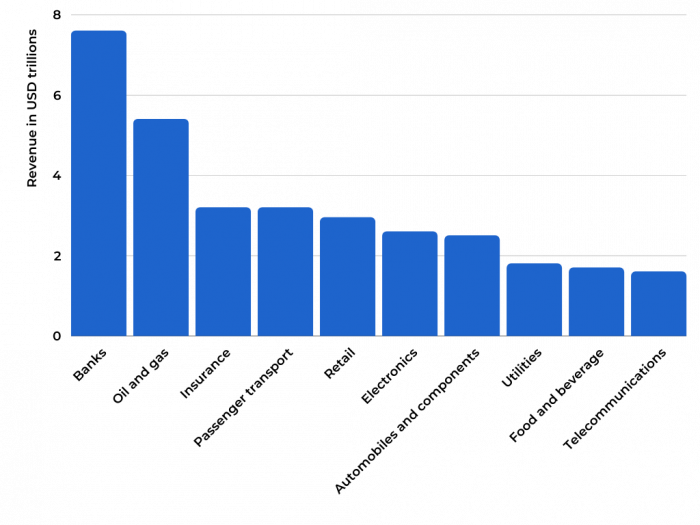
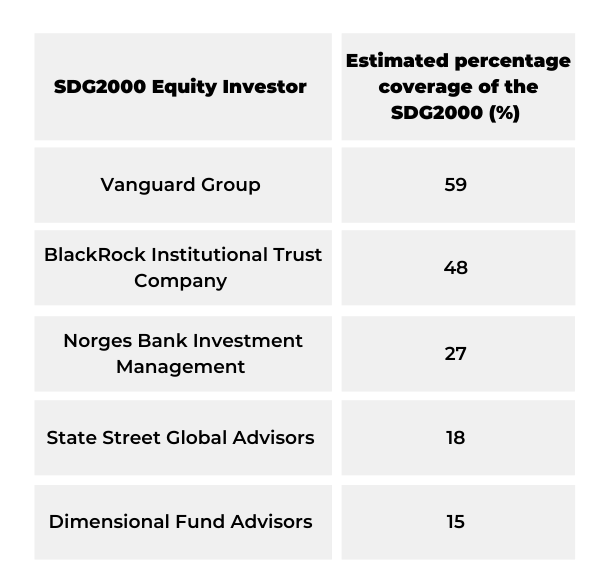
The SDG2000 are regional leaders
These 2,000 companies represent both the public (74%) as well as private, government owned and cooperatives (26%) which are best placed to driving global transformational change in each region. The SDG2000 includes companies across the world as seen in figure 2. Throughout 2020, WBA placed a stronger focus on developing countries in line with our mission to build a movement to measure and incentivise business impact towards a future that works for everyone. In line with this, company representation in Sub-Saharan Africa increased by 15% and by 9% in East and South Asia & Pacific. To give one example, for the Oil and Gas industry, we included two more companies based in Latin America and one in Sub-Saharan Africa to enhance representation in those regions, taking into consideration keystone principle 5 which states ‘The company has a global footprint, particularly in developing countries.’ In this way, we aim to better understand and capture corporate impact in both developed and developing countries.
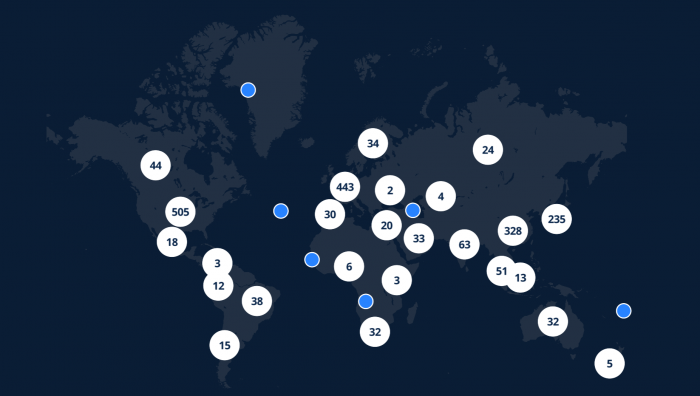
The SDG2000 employ millions across the world
Another important factor when determining the influence of the 2,000 keystone companies is by looking at the number of people they impact through employment. Across the world, the companies across the SDG2000 collectively employ over 102 million people directly and many millions more through their supply chains. Industries with the highest estimated number of employees are shown in figure 3, with the retail industry noted as the top employer. At a company level, in table 2 retail companies such as Walmart are some of the largest employers, employing between half a million to 2 million employees worldwide. To ensure that these people are at the heart of business contributions to the SDGs, our social transformation focuses on achieving universal human development by respecting human rights, promoting equality and empowering people to pursue the opportunities and choices they value. The recently launched social transformation framework sets out the societal expectations for business conduct that companies should meet in order to leave no one behind. This includes companies’ obligation to provide and promote decent work for all their employees, including in their supply chain by, for example, paying a living wage.
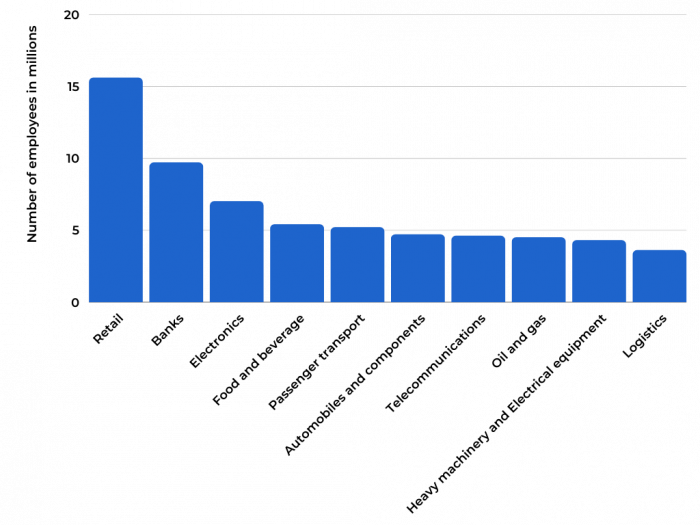
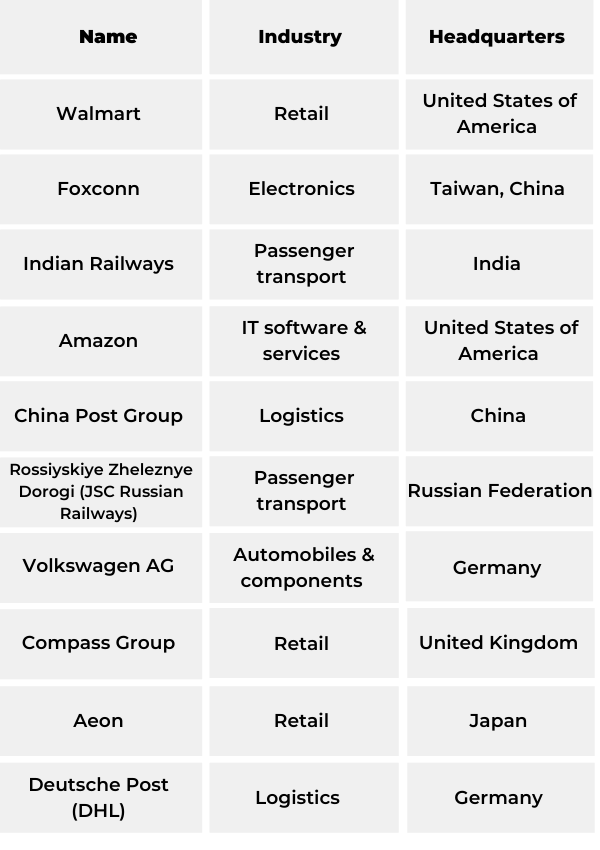
The Alliance and the SDG2000
Another way to explore the significance of the SDG2000 is through their connections with the 200+ organisations in our Alliance, who are working with us to hold the world’s most influential companies to account. We began by mapping out these 2,000 companies to 14 of our Allies, which resulted in a 87% overlap. However, only 14% of the Allies included are linked to 5 or more keystone companies. Looking at industries, the containers and packaging industry appears to be the most engaged by Allies across the SDG2000. It is followed by the personal and household products, automobile and components and pharmaceuticals and biotechnologies industries. On the opposite end, industries with the lowest levels of engagement include oil and gas, and utilities. From a regional perspective 90% of companies in the Europe and Central Asia region are covered, while only 74% of SDG2000 companies in the Middle East and North Africa and 78% of South Asian companies are engaged by our Allies. These findings demonstrate a critical need to prioritise partnership and collaboration in the race to achieving the SDGs. They also represent an important opportunity for us to empower our Allies to use our benchmark data in influencing the companies they engage with and ensuring that they are being held to account for the impact they generate.
Want to know more?
Curious to learn more about the 2,000 companies and how they relate to WBA’s work? We are proud to share the refreshed SDG2000 with updated headline figures, filters by system transformation and headquarter location, a new regional filter and new detailed company profiles which share past scorecards and baseline assessments, upcoming benchmarks and the connection to our Allies.